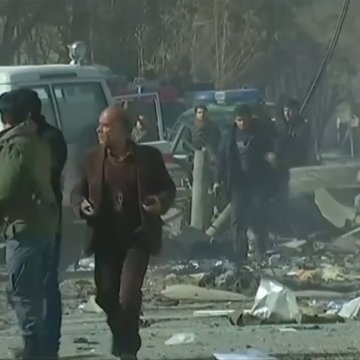- About
- Topics
- Picks
- Audio
- Story
- In-Depth
- Opinion
- News
- Donate
-
Signup for our newsletterOur Editors' Best Picks.Send
Read, Debate: Engage.
She was the breadwinner for her family, living under crippling poverty in the old Kabul for years before an ISIS-claimed suicide attack on Monday killed her among close to thirty people, including nine other journalists.
Mehram Durani and the rest of the nine promising Afghan journalists will be remembered for years for their courage in the face of a brutal insurgency that has entered its 17th year. Unlike many unfortunate past incidents of this sort, the journalists were not caught between the warring sides, but deliberately targeted by two ISIS militants, reportedly disguised in journalist attire among the crowd.
Durani's ageing parents, friends and colleagues, including myself, were shocked upon hearing the news of the targeted attack and the killing of Mehram, a fierce journalist, producer of the woman's programme on Azadi Radio and a gentle person.
The Islamic State group was quick to take full responsibility for the twin-suicide bombing during the morning rush hour in the capital’s Shash Darak area around 8 a.m. (0330 GMT), situated inside the supposedly highly-secure green zone of the city at.
Among other fallen journalists in this heinous attack on the free press are Abdullah Hananzay, Shah Marai, Mariam Tokhi, Yar Mohammad Tokhi, Salim Talash, Ali Salimi, Ghazi Rasouli, Nowruz Ali and Sabawoon Kakar. It has taken decades for Afghans to restore the freedom of expression, after years of brutal oppression under the hardliner Taliban. However, keeping this freedom continues to prove a daunting task, one which often results in deadly assaults by different powerful individuals and terror groups.
In another incident on the same day, a BBC Pashto Service journalist, Ahmad Shah, was shot dead in Khost province by unknown gunmen. This shooting marked the second targeted-killing of journalists in Afghanistan. Last week, Abdul Hanan Arghand, a Kandahar-based journalist was shot dead by unknown motorcycle riders in Kandahar city on Wednesday 25 April.
This is the single bloodiest attack on Afghan journalists after a Taliban-claimed suicide attack on a bus carrying Tolo News employees in January 2016 killed six journalists and staff members.
Behind each death is a tragic story of courageous individuals who fought to sustain the right to freedom of press and information. One of the killed journalists was Shah Marai, a longstanding cameraman for the Agence France-Presse (AFP), a father of six children. Yar Mohammad Tokhi, another journalist associated with Tolo News, was the only breadwinner for a large family, with his mother and sister are suffering from cancer.
This marks the deadliest day for reporters since 2001, sparking worldwide outrage and mourning. Yet despite the attack on the free press and the grave consequences this poses on an international level, those spreading terror in the name of their sacred ideologies are showing no remorse at all.
